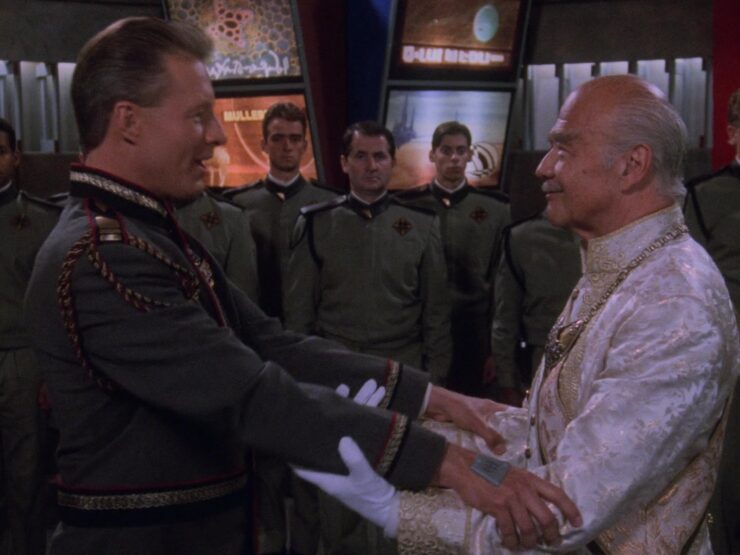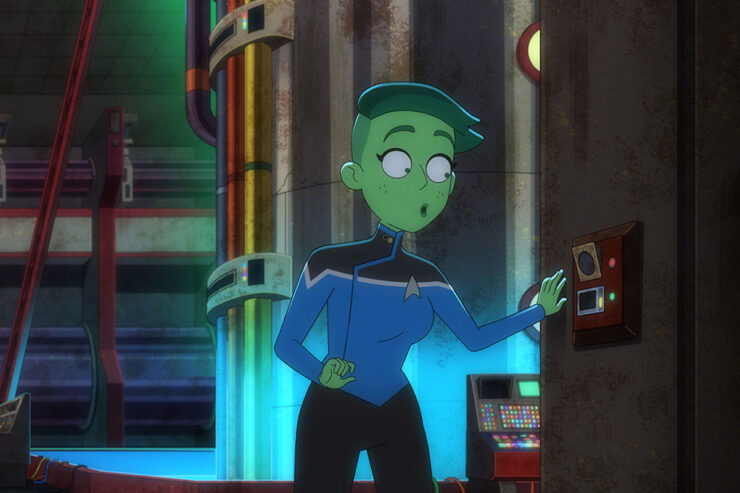The laws of physics being what they are (and ruling out the Bussard ramjets so popular in late 20th century SF), getting from one solar system to another is likely to consume entire human lifetimes. This is fine for robot probes, but what about human passengers? How will they fare with journeys that require one generation to commit their descendants to lives spent in the dark between the stars?
Unless travelers are fortunate enough to be on a ship crewed by Quakers, odds are the voyage will end very badly. Here are just five of the many failure modes for generation ships…
Civil Disorder
Imagine living in a small town with no exit and little means of communication with the greater human sphere for the entirety of your life. Imagine living cheek by jowl with people for whom you do not care and who dislike you. How long would it take disputes to simmer over into open violence? How would mutiny and civil war affect an isolated, fragile life-support system?
While the generation ship in Elizabeth Bear’s Dust did manage to reach a destination, it wasn’t a desirable one: the system is on the brink of a supernova. Time to leave! But there’s a problem: there are insufficient resources to save everyone. The obvious solution is to make sure that you are saving the right people. There being no consensus on who exactly is worth saving, conflict is inevitable.
This is just one book out of many about civil disorder on a generation ship. Stories of mutinies and civil war on sub-light starships go back as far as Leinster’s 1935 “Proxima Centauri.”
Cultural Amnesia
It’s easy for small groups to forget their history, either deliberately or by accident. Even written records may not help, if nobody has any reason to consult the archives. After generations in space, communities may forget who they are or what they set out to do.
Greg Bear’s 2010 Hull Zero Three tells the tale of an individual experiencing such amnesia. Sanjay wakes not knowing who he is, where he is, or what his purpose is. He is a clone, one of a series created for a particular purpose, and on his shoulders may rest survival of the mission…but only if he can discover what that is, and survive long enough to succeed. Which, as you may guess from “one of a series of clones,” is something his predecessors failed to do.
Hull Zero Three strongly reminded me of SPI’s obscure classic game, The Wreck of the B.S.M. Pandora, which appeared in the May 1980 edition of Ares. No doubt this is another case of independent parallel development.
Inbreeding
Possessing by definition small gene pools, it’s possible for generation ship populations to venture down the same unfortunate paths seen in certain dog breeds or European aristocratic lineages. Thus, when the ship reaches its destination, its passengers may be unable to prosper in the challenging environment of an alien world.
Frederik Pohl and Cyril M. Kornbluth’s Search the Sky is a curious example of a setting with active communication between star systems thriving despite the fact that communication has to be carried out by “longliners,” miniature versions of the generation ships that delivered colonists to alien worlds. Crews set off hale and hearty; a few centuries in space ensure their descendants have to be institutionalized. Lamentable enough, but as the novel makes clear, in no way unique to longliner crews.
A steadfast belief in a genetic equivalent of Gresham’s Law fueled much of Kornbluth’s science fiction. Those familiar with his work will not be surprised to discover that absolutely every world he and Pohl chronicle in this work is a doleful example of dysgenics in action, even the world whose gene pool was the largest. His conviction that he was surrounded by degenerate idiots is only one component of the distinctive Kornbluth charm.
Lightspeed Leapfrog
Generation ships may arrive at their destination only to discover that, while they were still traveling, much faster propulsion systems had been developed. The system towards which they spent centuries traveling might have already been settled by faster, perhaps even superluminal craft. Whether launching now makes more sense than waiting for technology to improve may be answerable only after the fact.
The designers of the starship Flashaway featured in Don Wilcox’s 1940 “The Voyage That Lasted 600 Years,” foresaw many of the pitfalls of a six-century voyage. Professor Gregory Grimstone was assigned the arduous task of keeping the crew on-mission, waking once per century to guide the current crew. Unusually for generation ship stories, Grimstone’s efforts were largely successful…and also utterly futile, since by the time Flashaway reached its destination, it had long since been settled by American starships able to cross interstellar gulfs in just six years.
While poor Wilcox suffers the injury often experienced by vintage authors—later writers so thoroughly cannibalized his tale that what was original in 1940 seems trite now—one thing that still stands out here is that America is still around in 2550. Often SF authors either subsume the US into a world state or imagine it breaking apart.
Mission Drift
Time has a way of rendering irrelevant issues that once consumed society. The optimists who march onto a generation ship have no guarantee that their descendants will share their views and values. Indeed, it would be astounding if the act of successfully crossing interstellar space did not transform the culture that accomplished it.
In Ursula K. Le Guin’s 2002 Paradises Lost, the citizens aboard Discovery possess all of the technological and social adaptations needed for four thousand people to survive their long voyage. Thus, the development of at least two factions, one willing to pursue the original goal of settling another world, and one which sees no compelling reason to abandon a craft that could sustain them comfortably indefinitely. Neither community is at all interested in compromise.
The primary factor that saves the characters in Paradises Lost from being exemplars of Civil Disorder is author Le Guin, who was not particularly interested in recapitulating Orphans of the Sky’s backstory. Thus, compromise is not only possible, it is almost guaranteed that something along those lines will occur.
***
Perhaps you have your own favourite stores about generation ship failure, stories I inconsiderately didn’t mention. Or perhaps you simply want to chide me for overlooking Kim Stanley Robinson’s Aurora. Comments are, as ever, below.
In the words of fanfiction author Musty181, four-time Hugo finalist, prolific book reviewer, and perennial Darwin Award nominee James Davis Nicoll “looks like a default mii with glasses.” His work has appeared in Interzone, Publishers Weekly and Romantic Times as well as on his own websites, James Nicoll Reviews (where he is assisted by editor Karen Lofstrom and web person Adrienne L. Travis) and the 2021, 2022, and 2023 Aurora Award finalist Young People Read Old SFF (where he is assisted by web person Adrienne L. Travis). His Patreon can be found here.














